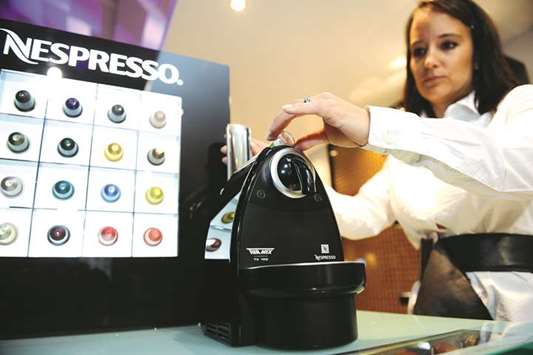Nespresso is extending its coffee buying in Colombia by going deep into previously conflict-hit regions after the Andean nation signed a peace accord last year that won a Noble Prize for President Juan Manuel Santos.
The unit of Nestle, the world’s largest coffee company, plans to purchase as much as five times more beans from the Caqueta region next year as part of a $50mn investment in sustainable high-quality production, the company said in a statement. Sourcing will reach San Vicente del Caguan, a community that was once at the centre of armed conflict.
Santos signed the peace deal in November 2016 to end a 52-year conflict with guerrillas of the Revolutionary Armed Forces of Colombia, or Farc. That’s allowed Nespresso to buy beans from previously inaccessible areas and launch limited-edition capsules from Caqueta earlier this year named Aurora de la Paz, or Dawn of Peace.
“Coffee will be a dividend of peace in Colombia,” Santos said in an e-mailed response to questions. “The end of the conflict is opening up opportunities for rural development, and as we see today with the announcement from Nespresso, post-conflict Colombia is attractive to foreign investors.”
The country is already the third-largest coffee producer and No 2 in the more-expensive and milder-tasting arabica variety. Expanding plantings to former conflict areas may boost production, with the nation targeting 18mn bags in a few years, according to Santos. That’s up from last year’s 14mn bags, which each weigh 60 kilograms (132 pounds). Arabica coffee futures have dropped 5.3% this year.
Nespresso will firstly work to improve production and boost quality from farmers already in the region, chief executive officer Jean-Marc Duvoisin said. Caqueta has a unique climate, with beans grown at low altitudes, low temperatures and high humidity, giving the coffee fruity notes and fine acidity.
“The first stage is to help the current farmers to work better their coffee, so that they have better quality coffee,” Duvoisin said in an interview in Geneva. “When you buy the lot for the first time, you reject about 50%. If you work with them, little by little you can get to 80% and sometimes even 100% but normally 80%. So that means they get more money.”
Nespresso’s agronomists are already working with more than 500 growers in Caqueta to implement the company’s sustainability programme, which includes improving yields and quality. Growers in conflict-hit areas are returning to farms abandoned years ago, so investing in training and providing technical assistance will be key to producing high quality beans, Santos said.

An employee uses a Nespresso coffee machine at a Nestle shareholders’ meeting in Lausanne, Switzerland (file). The unit of Nestle, the world’s largest coffee company, plans to purchase as much as five times more beans from the Caqueta region next year as part of a $50mn investment in sustainable high-quality production, the company said.
